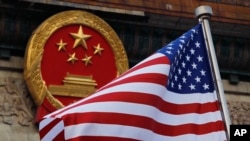U.S. Secretary of State Antony Blinken and White House National Security Adviser Jake Sullivan will meet with their Chinese counterparts in Alaska next week, the first meeting of senior American and Chinese officials since President Joe Biden took office on January 20.
Blinken and Sullivan "will meet on March 18 in Anchorage, Alaska with People's Republic of China (PRC) Director of the Office of the Central Commission for Foreign Affairs Yang Jiechi and State Councilor Wang Yi. The meeting will take place following Secretary Blinken's meetings with two of our closest regional allies in Tokyo and Seoul. Secretary Blinken and NSA Sullivan will discuss a range of issues with the PRC," said the State Department Wednesday.
A week ago, Blinken declared the relationship between Washington and Beijing is the world's "biggest geopolitical test" of the century. The top U.S. diplomat said Washington would continue to compete, collaborate and be "adversarial," if necessary, with China.
Relations between the world's two leading economies are at their worst in decades as the nations clash over trade, 5G technology, human rights and regional security.
"It would be naive to predict a reset of the U.S.-China relationship and I think that the Chinese are not naïve. They want to stabilize U.S.-China ties and cooperate where possible," said Bonnie Glaser, director of the China Power Project at the Center for Strategic and International Studies (CSIS) in Washington.
"Although Beijing is not emphasizing the competitive aspect of the relationship, the Chinese are well aware that it is now the dominant factor. The Biden administration has not jettisoned the Trump administration's approach to China — instead, it is seeking to compete more effectively," Glaser told VOA.
The Quad
Blinken and Defense Secretary Lloyd Austin are heading to Asia in coming days to reaffirm the U.S. commitment to allies in the region. Their first trip abroad as the top U.S. diplomat and defense chief comes after Biden meets virtually with Japanese Prime Minister Yoshihide Suga, Australian Prime Minister Scott Morrison and Indian Prime Minister Narendra Modi on Friday.
The so-called Quadrilateral Security Dialogue, or Quad, has been considered to be a counterweight to China's increasingly aggressive actions throughout the Asia-Pacific region. Beijing has denounced the Quad as an attempt to contain its development.
But officials from the Biden administration said the Quad is not about countering China.
"The Quad is not about any single challenge. It's not about any single competitor," said State Department spokesperson Ned Price when asked by VOA to what extent Friday's Quad meeting would address the adversarial aspect of U.S.-China relationship.
Price added that maritime security is one of many important issues on the agenda, "but our shared interests go well beyond that."
"I see a departure from how the Biden administration wants to talk about the Quad, but that doesn't mean the goals and objectives of this regional grouping will be any different," said Eric Sayers, a visiting fellow at the American Enterprise Institute.
"Whether we say the Quad is directly about China or large issues of regional order, what matters is the level of cooperation that can be achieved towards building resilience against China's multi-domain coercion campaign that we see unfolding in areas like the military, technology, telecommunication and trade," he told VOA.
Other analysts, including Derek Grossman who is a senior analyst with the U.S.-based Rand Corporation research institution, told VOA that China is on the agenda, even if left unspoken.
"It is clear that one of the key regional and global challenges that all four participants are concerned about is China, and in particular, Beijing's growing assertiveness in the East and South China Seas," Grossman told VOA.




